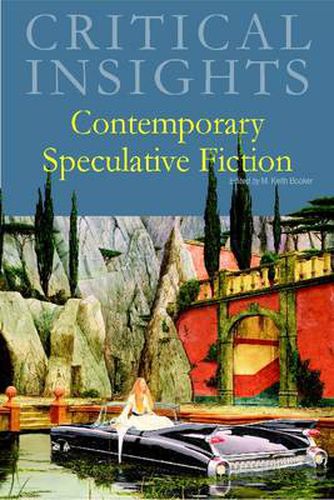Readings Newsletter
Become a Readings Member to make your shopping experience even easier.
Sign in or sign up for free!
You’re not far away from qualifying for FREE standard shipping within Australia
You’ve qualified for FREE standard shipping within Australia
The cart is loading…






Speculative fiction has a long and progressive history, from the mythos of J.R.R. Tolkien to the radical alternativity of China Mieville and the ecofeminism of Suzanne Collins. The last twenty years has witnessed a surge in the critical reception of speculative and fiction, as more work continue to move beyond the Tolkien tradition and open up the pertinent discussion of the permeable boundary between fantasy and science fiction. This volume in the Critical Insights series addresses the crossover genre of contemporary speculative fiction through a diverse set of texts and through multiple methodologies. For readers who are studying and approaching the genre for the first time, four essays survey the critical conversation regarding speculative fiction, explore its cultural and historical contexts, and offer close and comparative readings of key texts. Readers seeking a deeper understanding of the theme can then move on to other essays that explore it in depth through a variety of critical approaches. Works discussed include Suzanne Collins’ Hunger Games trilogy, Orson Scott Card’s Ender’s Game, Stephenie Meyer’s Twilight saga, Phillip Pullman’s His Dark Materials trilogy, Nalo Hopkinson’s Midnight Robber, and the Harry Potter series, as well as the works of China Mieville, Lauren Beukes, and Margo Lanagan. Among the contributors are Sarah Margaret Kniesler, Janice M. Bogstad, Peter Dendle, and Justyna Deszcz-Tryhubczak. Rounding out the volume are a list of literary works not mentioned in the book that concern the topic as well as a bibliography of critical sources for readers seeking to study this timeless theme in greater depth. Each essay is 2,500 to 5,000 words in length, and all essays conclude with a list of Works Cited, along with endnotes. Finally, the volume’s appendixes offer a section of useful reference resources:About This VolumeCritical Context: Original Introductory EssaysCritical Readings: Original In-Depth EssaysFurther ReadingsDetailed BibliographyDetailed Bio of the EditorGeneral Subject Index
$9.00 standard shipping within Australia
FREE standard shipping within Australia for orders over $100.00
Express & International shipping calculated at checkout
Speculative fiction has a long and progressive history, from the mythos of J.R.R. Tolkien to the radical alternativity of China Mieville and the ecofeminism of Suzanne Collins. The last twenty years has witnessed a surge in the critical reception of speculative and fiction, as more work continue to move beyond the Tolkien tradition and open up the pertinent discussion of the permeable boundary between fantasy and science fiction. This volume in the Critical Insights series addresses the crossover genre of contemporary speculative fiction through a diverse set of texts and through multiple methodologies. For readers who are studying and approaching the genre for the first time, four essays survey the critical conversation regarding speculative fiction, explore its cultural and historical contexts, and offer close and comparative readings of key texts. Readers seeking a deeper understanding of the theme can then move on to other essays that explore it in depth through a variety of critical approaches. Works discussed include Suzanne Collins’ Hunger Games trilogy, Orson Scott Card’s Ender’s Game, Stephenie Meyer’s Twilight saga, Phillip Pullman’s His Dark Materials trilogy, Nalo Hopkinson’s Midnight Robber, and the Harry Potter series, as well as the works of China Mieville, Lauren Beukes, and Margo Lanagan. Among the contributors are Sarah Margaret Kniesler, Janice M. Bogstad, Peter Dendle, and Justyna Deszcz-Tryhubczak. Rounding out the volume are a list of literary works not mentioned in the book that concern the topic as well as a bibliography of critical sources for readers seeking to study this timeless theme in greater depth. Each essay is 2,500 to 5,000 words in length, and all essays conclude with a list of Works Cited, along with endnotes. Finally, the volume’s appendixes offer a section of useful reference resources:About This VolumeCritical Context: Original Introductory EssaysCritical Readings: Original In-Depth EssaysFurther ReadingsDetailed BibliographyDetailed Bio of the EditorGeneral Subject Index